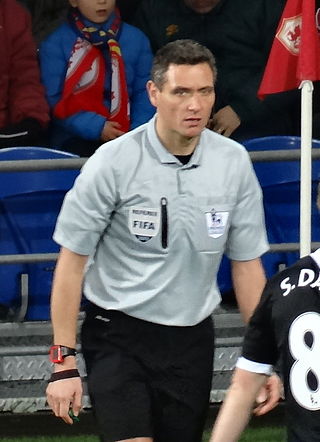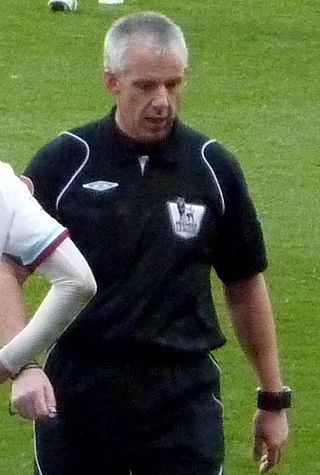Related Research Articles
Joseph Royle is an English football manager and former footballer. In his playing career as a striker, he debuted for Everton at the age of 16 and went on to play for Manchester City, Bristol City, Norwich City, and the England national team. Later, he managed Oldham Athletic, Everton, Manchester City, and Ipswich Town. He is currently a director at Oldham Athletic.

Francis Jeffers is an English football coach and former player, who was most recently a first-team coach at Oldham Athletic.

Matthew Rhys Holland is a former professional footballer who played as a midfielder. He is currently a director and club ambassador at Ipswich Town.
Dermot Gallagher is a retired Irish association football referee based in Banbury, Oxfordshire. He refereed in the Premier League of English football until May 2007.

Mark Clattenburg is an English former professional football referee.

Peter Walton is an English former professional football referee who officiated in the Premier League from 2003 to 2012. Beginning 2013, he was general manager of the Professional Referee Organization (PRO) in North America until being replaced by Howard Webb in January 2018.

Andre Marriner is a retired English professional football referee based in Solihull, West Midlands. He is a member of the Birmingham County Football Association.
Barry Knight is an English retired professional football referee, who officiated primarily in the Premier League. He retired in 2008 due to injury.
Stephen W. Dunn is an English former FA Premier League football referee. He resides in his birthplace of Bristol, England with his wife.

Christopher Foy is an English retired professional football referee. Following his first appointment as an official in the Football League in 1994 and his promotion in 2001 to the list of Select Group Referees who officiate in the Premier League, Foy refereed a number of notable matches, including the FA Community Shield and the finals of the FA Cup, Football League Cup and FA Trophy.

Paul Taylor is a former English football referee, who also took charge of Premier League matches in 2000-2001 before reverting to the Football League. He also officiated in UEFA and FIFA competitions. He subsequently re-located to Hertfordshire.
Lawrence Roger Dilkes is an English former football referee who officiated in the Football League and Premier League. During his time on the National List he was based in Mossley, Lancashire.
Stephen J. Tanner is an English former association football referee who operated in the Premier League and The Football League. Tanner was also a FIFA listed referee between 2008 and 2009.

Lee William Probert is a former English professional football referee who officiated primarily in the Premier League. He was born in Aylesbury but is now based in Dubai and is the Referees Director for the UAE Football Association.
Terence Holbrook is an English football referee formerly in the Football League and Premier League. During his refereeing career he was based in Walsall, and subsequently Wolverhampton, both in the West Midlands.
Keith Paul Stroud is a professional English football referee who officiates in the Football League.
Philip J. Joslin is an English association football referee who operates in the Football League. In addition, he has previously held the position of assistant referee for both the Premier League and FIFA, and also fulfilled that role in the 1998 FA Cup Final at Wembley.
Anthony Bates is a former English association football referee who operates in the Football League, and previously served as assistant referee for UEFA in the Euro 96 competition. He also refereed the FA Women's Cup Final in 2007. On average, Bates gave a high 4.0 cards per game in the 1998–99 season, the highest so far in his career.
The Football League play-offs for the 1997–98 season were held in May 1998, with the finals taking place at the old Wembley Stadium in London. The play-off semi-finals were played over two legs and were contested by the teams who finish in 3rd, 4th, 5th and 6th place in the Football League First Division and Football League Second Division and the 4th, 5th, 6th and 7th placed teams in the Football League Third Division table. The winners of the semi-finals will go through to the finals, with the winner of the matches gaining promotion for the following season.

The 1998 Football League First Division play-off final was an association football match played on 25 May 1998 at Wembley Stadium, London, between Charlton Athletic and Sunderland. The match was to determine the third and final team to gain promotion from the Football League First Division, the second tier of English football, to the Premier League for the 1998–99 season. The top two teams of the 1997–98 Football League First Division season gained automatic promotion, and the teams placed from third to sixth place in the table took part in play-off semi-finals; Sunderland had ended the season in third position and Charlton had finished fourth. The clubs won their semi-finals and competed for the final promotion place. Winning the game was estimated to be worth up to twenty million pounds to the successful team.
References
- ↑ Confirming his middle initial Archived 21 March 2005 at the Wayback Machine (K): soccerbase.com website.
- ↑ Place of birth [ permanent dead link ] (Preston): from an article in the Lancashire Evening Telegraph. Retrieved 6 February 2008.
- 1 2 3 "Battle of Bramall Lane", Sheffield Utd v. West Brom, 2002: match report at the BBC Sport website.
- 1 2 Other occupation Archived 16 May 2006 at the Wayback Machine , also details of promotion to the Premier League: article at the ThisIsLancashire.co.uk website.
- ↑ First year as a referee (1978): interview at the Football Association Official website.
- ↑ Crewe v. Torquay, first match as a League referee, 1992: soccerbase.com website.
- 1 2 3 Biographical detail [ permanent dead link ]: article at the Bury Times website.
- ↑ Charlton v. Ipswich, old First Division play-off semi-final 2nd leg, 1998: soccerbase.com website.
- ↑ Charlton v. Sunderland Archived 2 June 2008 at the Wayback Machine , old First Division play-off final, 1998: soccerbase.com website.
- ↑ FA Vase Final, Berkhamsted v. Taunton, 2001: soccerbase.com website.
- ↑ League Two play-off semi-final first leg, Hull v. Orient, 2001: soccerbase.com website.
- ↑ League One play-off semi-final second leg, Walsall v. Stoke, 2001: soccerbase.com website.
- ↑ League One play-off final, Reading v. Walsall, 2001: soccerbase.com website.
- ↑ First ever Premiership match, Ipswich v. Derby, 2001: soccerbase.com website.
- ↑ FA Disciplinary measures after the "Battle of Bramall Lane": BBC Sport website.
- ↑ Sheff Utd 0 West Brom 3, the score at the end of the "Battle", was allowed to stand: soccerbase.com website.
- ↑ Unsworth dismissal and match details, Everton v. Chelsea, 2002: soccerbase.com website.
- ↑ Everton v. Chelsea, 2002 – Moyes' reaction after Unsworth was sent off: match report at the Guardian Unlimited website.
- ↑ Matt Messias subsequently replaces Wolstenholme as 4th official for Everton v. Bolton game on 28 December: from match previews at the Guardian Unlimited website.
- ↑ Fourth official, England v. Australia, 2003: EnglandFootballOnline website.
- ↑ Last ever match, Millwall v. Coventry, 2003: soccerbase.com website.
- ↑ Eddie Wolstenholme: Referees' assessor 'died for 100 seconds' prior to Premier League game: BBC Sport website.
- ↑ Referees' Officer Archived 16 December 2007 at the Wayback Machine for the Lancashire FA: LCFA website.